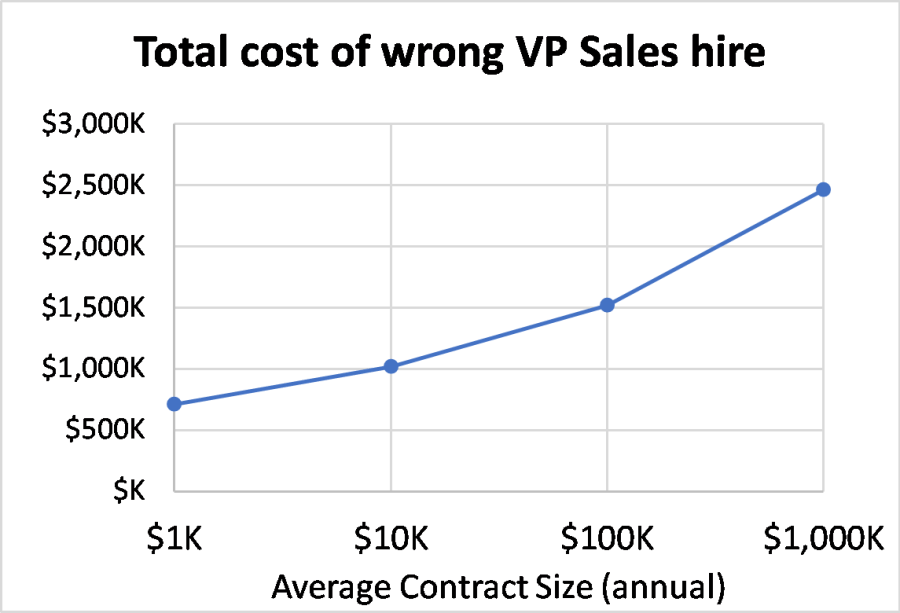The VP of Sales is the most difficult hire – and highest stakes – at an early-stage startup. Across the many startups we’ve invested in, we see success with a company’s first VP Sales hire less than 25% of the time. This pales in comparison to a 60-75% success rate across all hires. Worse, there is so much riding on a VP Sales hire for a Series A or B stage startup because the cost of failure is high. Below is the estimated failure cost based on average contract size and assumptions on quotas, team size, etc for a range of software startups from SMB to Enterprise. (detailed assumptions and calcs at end of article for nerds)

There are two components included in the total cost above: (1) what you pay the wrong hire for the length of time they work for you, and more importantly, (2) the negative impact on potential rep quota productivity, assumed here to be negative 50% (you spend money on reps because generals need soldiers, but they are only half as productive as they should be because of poor leadership). The latter is the “opportunity cost” of not having a good sales leader. The total cost of the wrong VP Sales hire goes up significantly with contract size because longer sales cycles mean it takes longer to know if a VP Sales is effective. In enterprise, you might not know for as long as a year, and it could cost you more than $2M. That can equate to 9 months of runway. Bummer.
Why do startups so often fumble the VP Sales hire?
Here is the typical story: You had good momentum with founder sales and a few early sales people and got to $1M in ARR. This gave you the story to raise a $5M (Midwest) or $10M (coasts) financing. Now you’re in the big leagues; two VCs are staring at you in your first Board meeting waiting to hear how you’ll hit the $3-4M ARR you promised. They want to see revenue, and you want someone else holding that hot potato! Neither is a good reason to hire the VP Sales at this exact moment in time, but you do it anyway – quickly for the next Board meeting. That’s progress, right? It doesn’t work because:
- YOU: You’ve never hired a sales leader before, and they all sound great (duh, they’re sales people)
- THEM: Good sales leaders are rarely “on the market” – they are poached. While this is true of most types of talent, good sales leaders make a lot of money and really like money. They are the least incented of any talent to look for something new if they are doing well. This is unlike many tech and product people who more heavily value diversity of experience (and new option grants).
- YOUR STARTUP: The company isn’t actually ready to scale – the most common issue. Maybe you have 10-15 MB customers or 3-4 enterprise customers, but your brand is young, you are still honing your value prop/message and the repeatable sales process (where you find customers, how you convince them and how you close them) is still uncertain. Most of these need to be resolved before you hire a heavy hitting sales leader.
Points (1) and (2) can be overcome with the help of VP-Sales-hiring-experienced advisors in your interview process, combined with a methodical talent poaching strategy (you didn’t hear me say that). (3) is about nailing the basics of finding product market fit and a repeatable sales process. This means you. No one can do it for you. Practically, this is a “CXO sales model” where you and your founding executive suite – with the help of a few sales people for leverage and to test scale – find the repeatable lead sources, messaging and process to close sales. For companies with a $10K ACV, this typically happens above 150 customers or $1.5M ARR. For companies with enormous enterprise contracts of $500K-1M, it might not be until $3-4M in ARR or more.
Experienced tech founder and CEO Ben Alpert (sold Care Team Connect to the Advisory Board and now running Upfront Healthcare) puts it this way:
It is often a default reaction to assume that more sales people = more sales. One thing I have experienced when hiring too early is the natural desperation for the sales person to make something happen without the right support. That desperation can cause the person to chase the wrong prospects/opportunities which takes focus away…
What Ben describes is a key effect of hiring sales leadership too early. With generals come soldiers, and suddenly you have a flock of sales people desperately seeking revenue without the tools, process and brand support needed to do so at scale.
If instead you wait until repeatability is proven, a great VP Sales hire with appropriate company stage and business model experience is much more likely to be successful. There team will be too. You will also be better equipped to determine if the new VP Sales is executing. Having acted as the VP Sales yourself, there is a process you know works, and you can both train and hold the VP Sales accountable to it. As Ben puts it, the VP Sales hire is about leverage for the founding team in a proven process, not passing the hot potato.
Check out more VP Sales hiring tips and tricks from @jasonlk on Close.io’s blog post. The one tip I struggle with is Mistake 2: “Waiting to hire VP Sales too late”. It is true you should start scouting and meeting candidates early – casual cups of coffee now pave the way for a top VP Sales hire a year from now. However, 90% of the time the mistake is hiring a VP Sales too early, not too late.
Assumptions/calcs for chart:


3 thoughts on “When not to hire your first VP Sales”